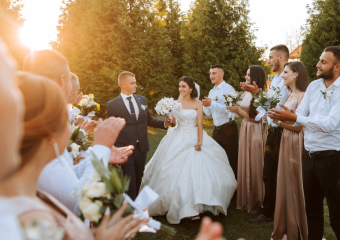AI-Powered Planning Tools Every Multicultural Wedding Vendor Needs
AI-Powered Planning for Multicultural Weddings: Tools Vendors Need
In today’s diverse world, weddings often blend various cultures, traditions, and customs, creating beautiful yet complex celebrations. AI-powered planning for multicultural weddings is quickly becoming essential for vendors who want to deliver seamless, personalized experiences. These intelligent technologies help vendors manage the intricate details that come with combining multiple cultural elements, making the planning process more efficient, accurate, and customer-centric.
Understanding the Complexity of Multicultural Weddings
Multicultural weddings involve the amalgamation of differing rituals, languages, and expectations from two distinct families. From the colors and attire to food and ceremonial practices, these celebrations are rich in diversity but also present unique challenges for vendors. They must navigate dietary restrictions, varied timelines, and varied cultural sensitivities while coordinating with multiple parties.
This is where AI-powered tools can revolutionize the traditional wedding planning model, providing the precision and flexibility needed to handle such complexity. These systems are designed to learn from data, automate repetitive tasks, and offer tailored recommendations that respect cultural nuances.
Key Benefits of AI-Powered Planning for Multicultural Weddings
AI-powered planning solutions offer several advantages that can elevate the vendor’s ability to handle multicultural weddings:
- Enhanced Personalization: AI algorithms analyze clients’ preferences, background, and traditions to suggest vendors, themes, or menus that honor the couple’s cultural identities.
- Improved Communication: Language processing AI bridges communication gaps between vendors and families speaking different languages or dialects, ensuring clear understanding.
- Streamlined Scheduling: Coordinating multiple ceremonies and rituals that might span several days or even weeks can be tricky. AI-powered scheduling tools enable vendors to map out timelines efficiently.
- Resource Optimization: Intelligent software predicts demand for certain services or items based on cultural patterns, helping vendors stock up or hire accordingly without waste.
- Conflict Resolution: AI can anticipate potential cultural clashes or misunderstandings by highlighting incompatible practices and proposing alternatives.
Essential AI Tools Every Vendor Needs
To fully leverage AI-powered planning for multicultural weddings, vendors should consider incorporating the following tools:
1. Cultural Insight Platforms
These tools use machine learning to provide detailed information about different cultural traditions. They help vendors educate themselves and their teams, ensuring respectful and authentic representation during weddings. This includes attire recommendations, culinary customs, and ceremony guidelines.
2. Smart Scheduling and Coordination Software
With complex schedules involving multiple ceremonies—such as traditional engagement, religious rites, and post-wedding celebrations—AI scheduling platforms can automatically create and adjust timelines. They factor in venue availability, vendor booking times, and travel buffers, allowing vendors to avoid conflicts and last-minute scrambling.
3. AI-Driven Language Translation Services
For multicultural weddings involving families who speak different languages, translators powered by AI natural language processing ensure smooth communication. They translate contracts, emails, and real-time conversations, preventing misunderstandings and fostering harmony.
4. Personalized Recommendation Engines
These AI-based platforms analyze client preferences and cultural backgrounds to suggest ideal floral arrangements, menu options, music playlists, and decor styles. By treating each wedding as unique, vendors can provide bespoke experiences that feel genuine and tailored.
5. Budget Management and Forecasting Tools
Financial planning can become tricky with multiple cultural elements requiring specific expenditure. AI helps by forecasting costs based on past weddings, highlighting potential budget overruns, and offering cost-saving alternatives without compromising quality.
Adopting AI Without Losing the Human Touch
While AI-powered planning is a game-changer, vendors must balance technology with empathy and personal engagement. A multicultural wedding is deeply emotional and symbolic, so human intuition, cultural awareness, and genuine connection remain irreplaceable.
Vendors should use AI as a support system that empowers them to focus on storytelling, creativity, and client relationships. By automating routine tasks and providing insightful data, AI frees up more time to understand clients’ visions and craft memorable experiences.
Looking Ahead: The Future of Wedding Planning
The integration of AI in multicultural wedding planning is only beginning. Emerging technologies like augmented reality (AR) and virtual reality (VR), combined with AI, could soon allow couples to visualize multicultural setups before the big day. Predictive analytics might anticipate evolving trends in cultural fusion ceremonies. As AI becomes more sophisticated, vendors who embrace these tools will be better positioned to meet the unique needs of diverse couples.
Final Thoughts
AI-powered planning for multicultural weddings equips vendors with the tools needed to manage intricate cultural details, streamline execution, and offer highly personalized services. By embracing AI, vendors not only increase efficiency but also enhance client satisfaction, creating celebrations that honor multiple heritages with grace and precision. As weddings continue to reflect the beautifully interconnected world we live in, AI will be an indispensable partner in making dream weddings a reality.





